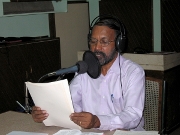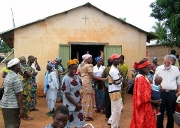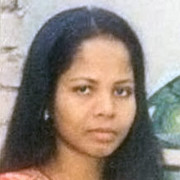Drug traffickers suspected in robbery/murder.
By Elisabeth Isais
 |
| John and Wanda Casias |
MEXICO CITY, February 3 (Compass Direct News) – A married couple who had served for 28 years as Baptist missionaries in Mexico were murdered on Tuesday (Jan. 31) at their home near Monterrey in El Cercado, Santiago, Nuevo Leon.
John Casias, 76, and Wanda Casias, 67, were strangled with electrical cords when intruders broke into their house and stole a safe, televisions and ministry vehicles, along with other items. The area has suffered heavily from attacks by drug cartels in recent weeks, including the murder of the mayor of El Cercado, leading to the tentative conclusion that the crime was committed by people serving narcotics traffickers.
Drug traffickers in Mexico oppose the message of Christ because it turns people away from their business, and thus Christians have been among the targets of the criminals. Christians noted that the assailants would not have needed to kill the missionary couple in order to rob them.
The killers left Wanda Casias dead inside the house, and the body of her husband was reportedly found in a storage room of a small building elsewhere on the property.
They were affiliated with the Global Independent Baptist Fellowship; the couple’s home church is located in Lewisville, Texas.
Their ministry included the founding of churches, beginning with the First Fundamentalist Independent Baptist Church in their locality, and they also did work in Zacatecas, San Luis Potosí, Coahuila, and other parts of the state of Nuevo Leon. Daily vacation Bible schools and youth camps were important aspects of their ministry, and they placed strong emphasis on Bible study and music.
They are survived by 10 children who have reportedly said they hope to continue their parents’ ministry.
Peace in Puebla
With intervention by Puebla state authorities after Protestants came under threats of expulsion and death, Catholics in San Rafael Tlanalapan, have agreed to allow evangelicals to construct a worship place in the town far from the Catholic church building.
Last fall Catholics threatened to crucify the Protestants if they didn’t leave town immediately. Parishioners later revealed that a local priest incited them to make this threat, and after this became public, Catholic authorities transferred the priest to another town.
State officials initiated negotiations to resolve the conflict, and an agreement was reached last October; officials will be responsible to ensure that terms of the agreement are kept.
Pastors Agustin Castillo Morales and Josue Ovando Jimenez accepted the pact, which calls for them to hold worship services far from the Catholic church site. Evangelical leaders from Mexico City celebrated the peaceful solution to the problem in an event that included musical groups.
Last September about 70 Protestants in San Rafael Tlanalapan had been given the ultimatum to leave immediately or be “crucified or lynched.” Catholics (not “traditionalist Catholics” that mix Catholicism with indigenous practices, as previously reported) in the town, near San Martín Texmelucan, about 60 miles from Mexico City, reportedly threatened to burn down or otherwise destroy their homes.
The conflict goes back several years; in 2006, the Protestants asked for government help after Catholics led village authorities to cut off their water supply.
Last year the evangelicals promised to leave town at a Sept. 7 meeting, though the 200 Catholics present sought to beat them and expel them at that time (seewww.compassdirect.org, “Christians in Mexico Forced from Village,” Sept. 16, 2011). The Protestants sought refuge in nearby towns, including the municipal center of San Martin Texmelucan, where their churches have become prominent. Othersreportedly fled to a church building in Alto Aposento.
END
**********
Copyright 2012 Compass Direct News













